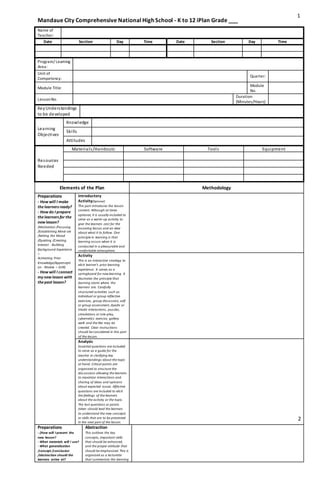
Mandaue City Comprehensive National High School K12 iPlan
- 1. Mandaue City Comprehensive National High School - K to 12 iPlan Grade ___ Name of Teacher: Date Section Day Time Date Section Day Time Program/ Learning Area: Unit of Competency: Quarter: Module Title: Module No. Lesson No. Duration (Minutes/Hours) Key Unders tandings to be developed Learning Objectives Knowledge Ski lls Attitudes Resources Needed Material s /Handouts Software Tool s Equipment Elements of the Plan Methodology Preparations - How will I make the learners ready? - How do I prepare the learners for the new lesson? (Motivation /Focusing /Establishing Mind-set /Setting the Mood /Quieting /Creating Interest - Building Background Experience – Activating Prior Knowledge/Appercepti on - Review – Drill) - How will I connect my new lesson with the past lesson? Introductory Activity(Optional) This part introduces the lesson content. Although at times optional, it is usually included to serve as a warm-up activity to give the learners zest for the incoming lesson and an idea about what it to follow. One principle in learning is that learning occurs when it is conducted in a pleasurable and comfortable atmosphere. Activity This is an interactive strategy to elicit learner’s prior learning experience. It serves as a springboard for new learning. It illustrates the principle that learning starts where the learners are. Carefully structured activities such as individual or group reflective exercises, group discussion, self-or group assessment, dyadic or triadic interactions, puzzles, simulations or role-play, cybernetics exercise, gallery walk and the like may be created. Clear instructions should be considered in this part of the lesson. Analysis Essential questions are included to serve as a guide for the teacher in clarifying key understandings about the topic at hand. Critical points are organized to structure the discussions allowing the learners to maximize interactions and sharing of ideas and opinions about expected issues. Affective questions are included to elicit the feelings of the learners about the activity or the topic. The last questions or points taken should lead the learners to understand the new concepts or skills that are to be presented in the next part of the lesson. Preparations - (How will I present the new lesson? - What materials will I use? - What generalization /concept /conclusion /abstraction should the learners arrive at? Abstraction This outlines the key concepts, important skills that should be enhanced, and the proper attitude that should be emphasized. This is organized as a lecturette that summarizes the learning 1 2
- 2. (Showing/ Demonstrating/ Engaging/ Doing /Experiencing /Exploring /Observing - Role-playing, dyads, dramatizing, brainstorming, reacting, interacting - Articulating observations, finding, conclusions, generalizations, abstraction - Giving suggestions, reactions solutions recommendations) emphasized from the activity, analysis and new inputs in this part of the lesson. Practice - What practice exercises/application activities will I give to the learners? (Answering practice exercise - Applying learning in other situations/actual situations/real-life situations - Expressing one’s thoughts, feelings, opinions, beliefs through artwork, songs, dances, sports - Performing musical numbers/dances, manipulative activities, etc.) Application This part is structured to ensure the commitment of the learners to do something to apply their new learning in their own environment. Assessment (Refer to DepED Order No. 73, s. 2012 for the examples) Levels of Assessment Assessment Matrix What will I assess? How will I assess? How will I score? Knowledge (15%) (refers to the substantive content of the curriculum, facts and information that the student acquires) What do we want students to know? (relevance and adequacy) How do we want students to express or provide evidence of what they know Process or Skills(25) (refers to skills or cognitive operations that the student performs on facts and information for the purpose of constructing meanings or understandings.) Skills as evidenced by student’s ability to process and make sense of information, and may be assessed in the following criteria: understanding of content and critical thinking Understanding(s) (30%) (refers to enduring big ideas, principles and generalizations inherent to the discipline, which may be assessed using the facets of understanding or other indicators of understanding which may be specific to the discipline)
- 3. Products/performanc es (30%) (Transfer of Understanding) (refer to the real-life application of understanding as evidenced by student’s performance of authentic tasks) Assignment Reinforcing the day’s lesson Enriching the day’s lesson Enhancing the day’s lesson Preparing for the new lesson Concluding Activity(Optional) This is usually a brief but affective closing activity such as a strong quotation, a short song, an anecdote, parable or a letter that inspires the learners to do something to practice their new learning. Wrap-up Finale Remarks: *You may add extra paper if necessary. 3